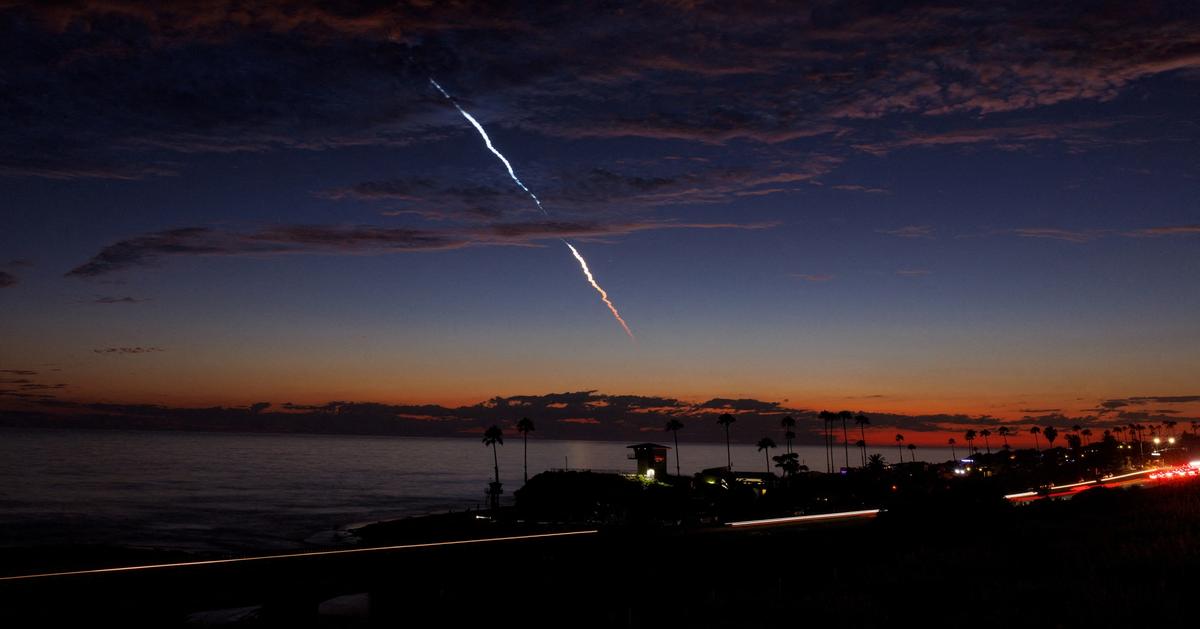- cross-posted to:
- [email protected]
- cross-posted to:
- [email protected]
I started doing amateur astrophotography last year with a camera, lens and startracker.
The way it works is you take dozens or hundreds of photos of the same thing, then combine them into one final image, a process called “stacking”.
To gather faint light, each photo is a long exposure gathering light for 30 - 120 seconds.
I have therefore taken over 20.000 long exposure shots of the night sky, pointing at different things, using wider and narrower lenses and NOT ONE SINGLE CLICK came without a Starlink streaking across the frame.
That’s fucking crazy, especially to think this wasn’t even a problem (on the same scale) more than 5 years ago.
It is crazy, and as I said in another comment this is going to be exponential. We will have many mega constellations like starlink in the next decade.
That’s actually incredibly sad. Damn.
Yeah, sadly this has become normal. The polution rate has reached ~100%. And sure, you already artificially build the final image anyways, but with Starlink, this has become a necessity. You can no longer take any individual shots, as they’re all just Starlink streaks.
What focal length do you normally shoot at? My rig is at 610mm and I get satellite trails mostly around dusk/dawn, but they all get rejected out during stacking
12/35mm for wide / nightscape shots, 135mm for regular wide field and 500mm for deep sky-ish stuff.
My sensor is APS-C, so the “effective” focal length is 1.5x the above lens values
Damn :(
What other objects interfered? The ISS i assume.
The ISS is visible from any single point you’re standing on for up to about a minute when passing directly overhead and then the next orbit isn’t close enough for you to see.
Some comm and weather sats here and there but really nothing crazy. It was even fun to have individual shots with a streak on it cause it was a relatively rare occasion.
Now there’s just no hiding from it. Yes, the process of stacking images averages out the streaks in the final image, but for the average person with a wide lens taking a milky way shot during summer camping it’s basically impossible to not have like 5 streaks on it.
I’m a nobody using my phone to take the occasional image stack using Google’s “night sight” mode on my Pixel 7 Pro. Out of the 30 or so pictures I’ve taken, one has a Starlink Trail.
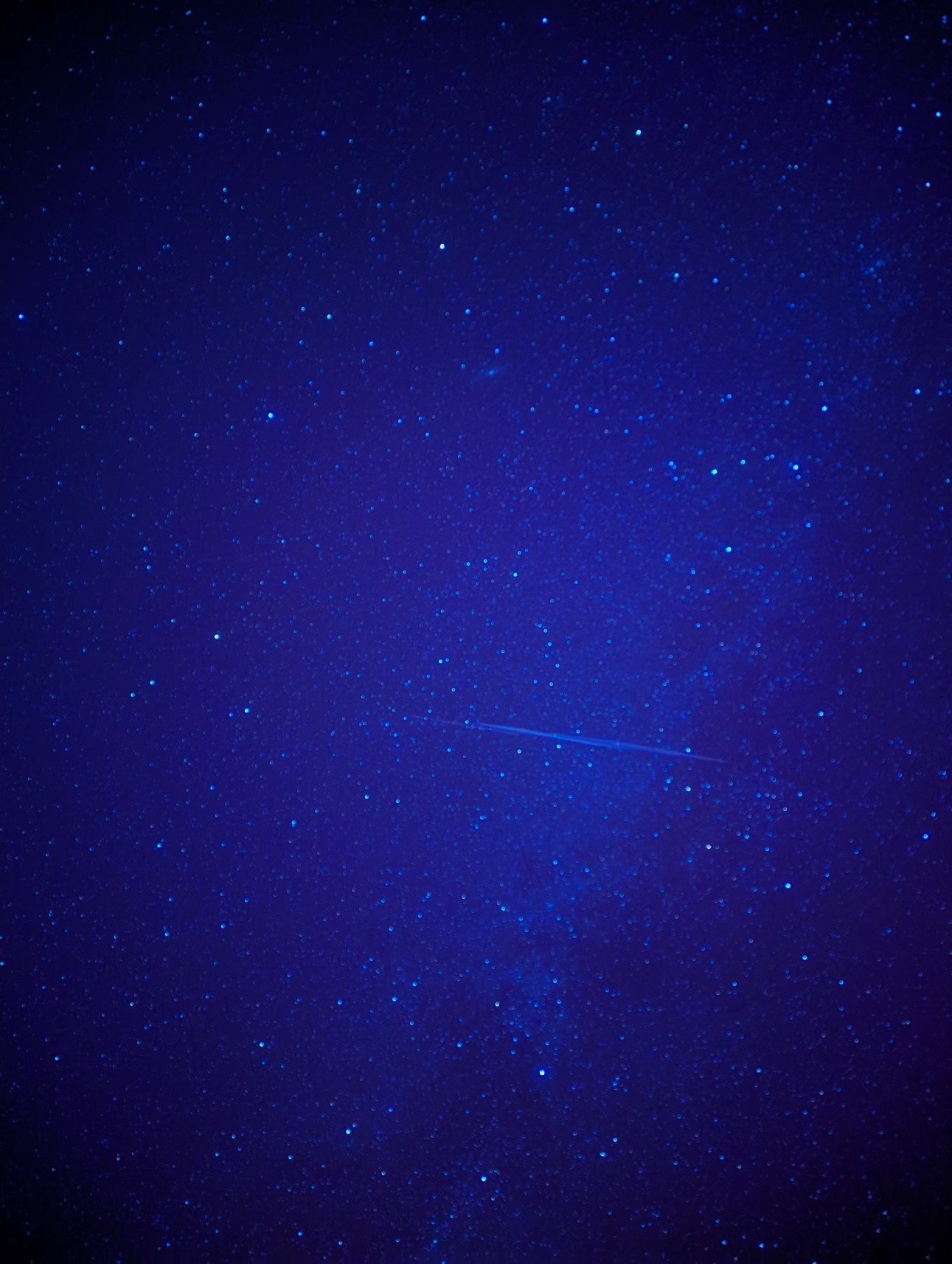
Not necessarily a “starlink trail” you took a photo of a satellite, could be starlink could be something else. Also the astrophotography mode on the pixels is purdy cool and fun to mess around with
I saw it with my eyes. It was without a doubt a string of 9 Starlink satellites. If you look closely, the image is a composite of multiple trails in a nearly colinear path.
Wow nice! If this was with the phone on a tripod or generally stationary that might be more than one trail, looks like 3 lines grouped up.
You can also see the Andromeda galaxy above it which is awesome for a phone!
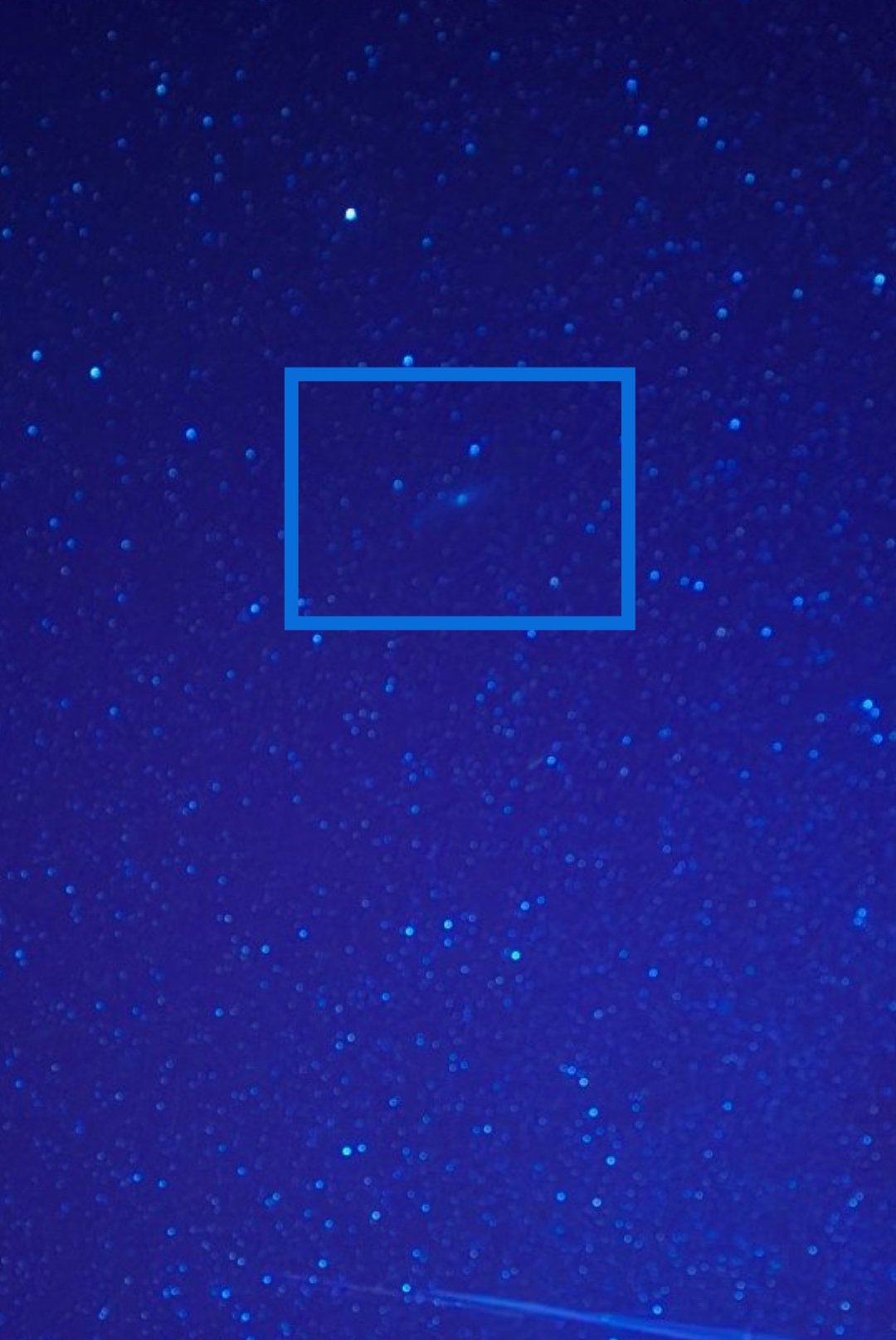
Haha, that’s not the best astro photo I’ve taken with my phone. It’s not even in focus. 😅 Let me dig up another. And yes, I knew that was Andromeda. It’s pretty cool that it captured it.
Here are the Northern Lights during the recent Perseid meteor shower with some stars.
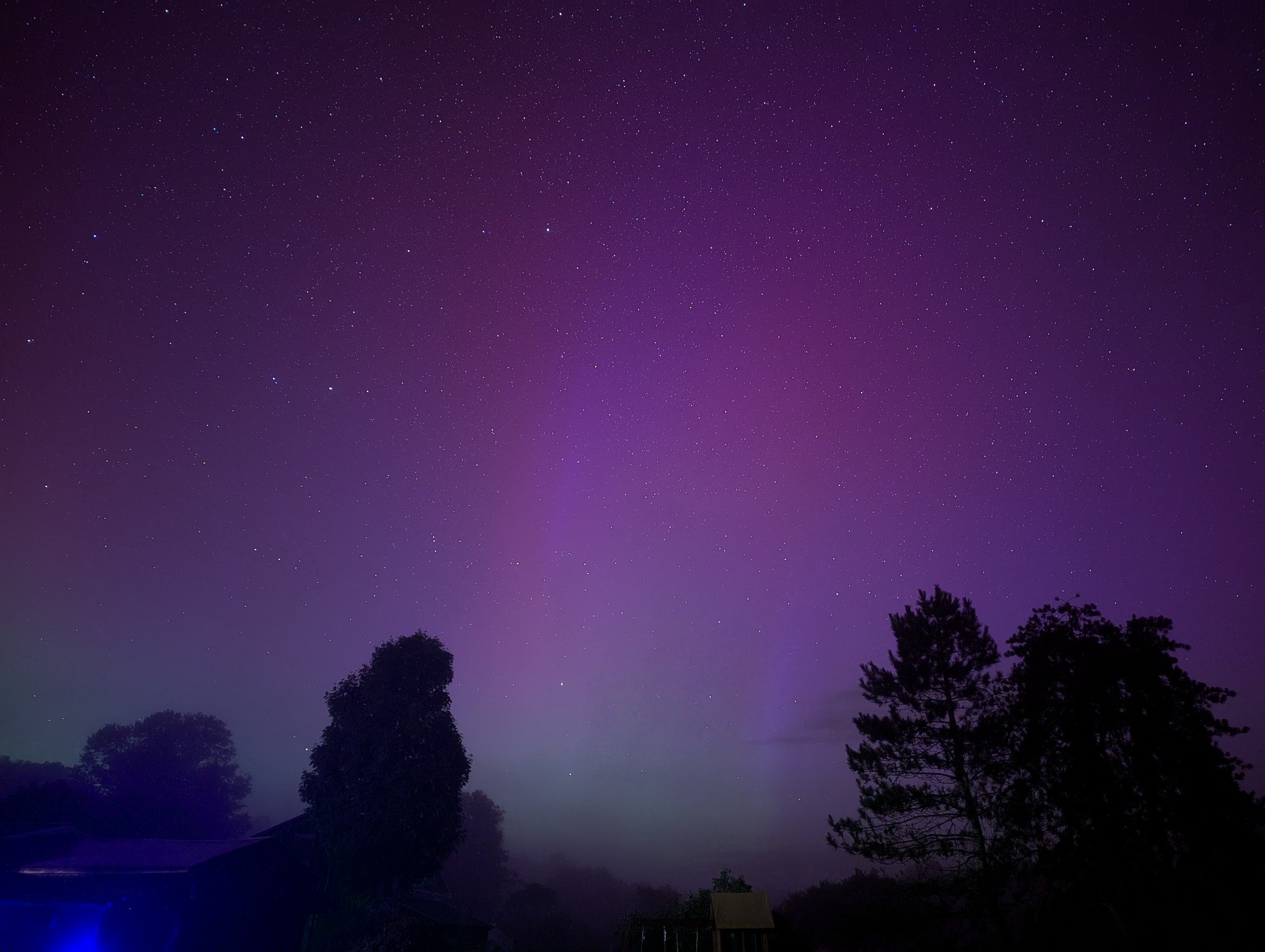
Ironically, I couldn’t really see the Northern Lights with my own eyes. It was foggy out, and they were very faint, but my phone’s astro mode could see them. I even have videos, because the camera app always makes a 1 or 2 second video from the individual images while taking an stacked astro photo.
Here’s one that shows the Milky Way pretty well.
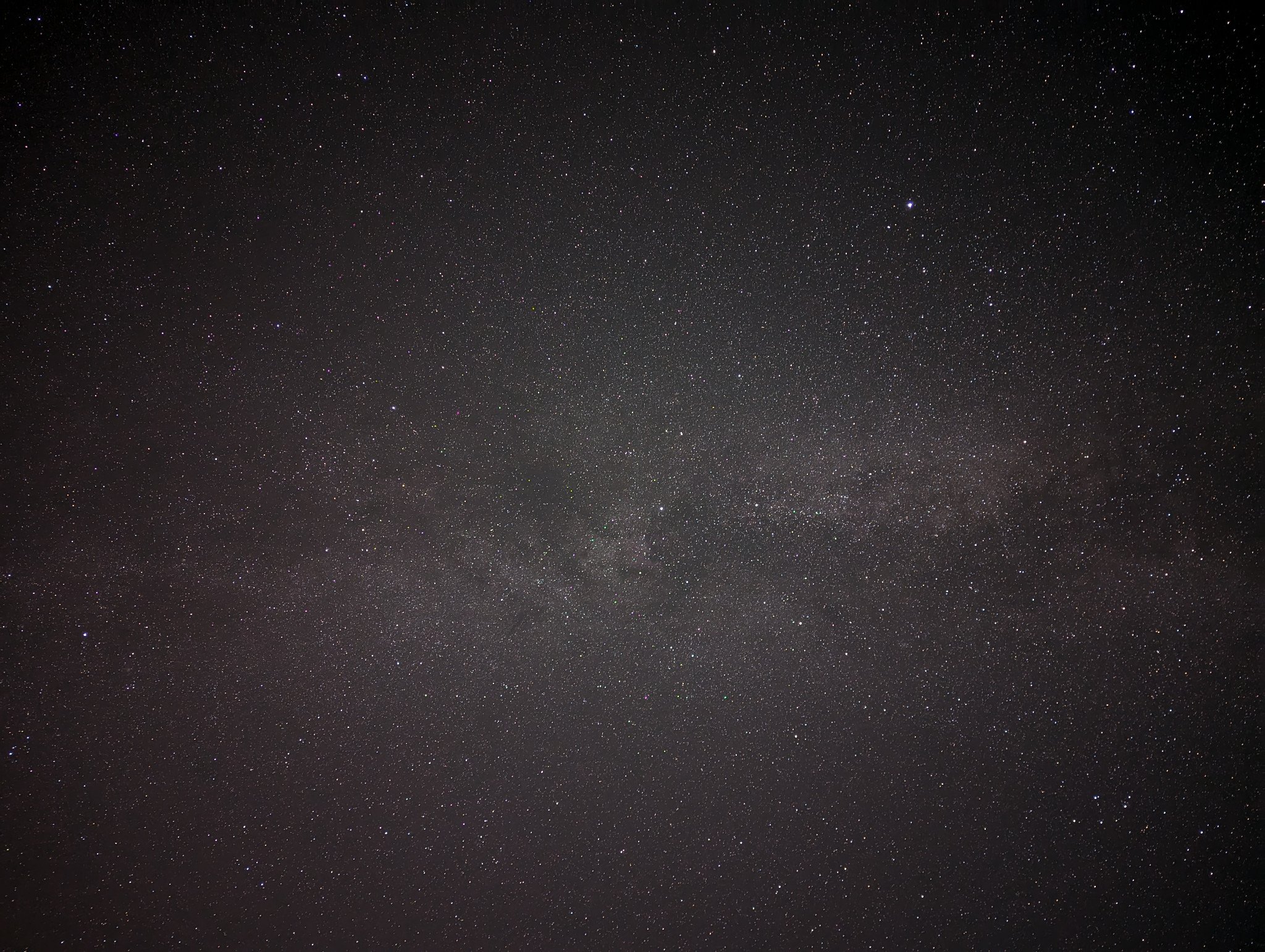
Out of that 120 second long exposure:
- how long was a satellite visible?
- how many frames out of how many did it stay in place?
- was its movement similar to any natural phenomena you were capturing?
Certainly this is a problem and will only get worse, but it really seems like the room and gloom is excessive and it ought to be reasonable to filter out
Sadly I blame everyone but starlink. It provides internet to rural areas that otherwise don’t have any viable high speed internet. Feds and states should have done anything to make sure these areas were being served. They weren’t and as a result $120/mo internet is reasonable.
You speak about the US but it fucked the sky up for the entire planet, for all of us.
That’s the main issue I see here, too. If you can provide this without the side effect, per-country, sure. Go ahead. Cool service.
Fucked up the sky for all of us? Who is “all of us”? Most of “us” live in mega cities with so much light pollution it blots out the night sky. Everyone in these horrid concrete jungles has high speed internet and absolutely no connection to the stars. Many of these people have never even seen the stars.
The ones living outside of these cities are the minority, and now they have internet. An internet they have been promised to the tune of countless billions for a very long time. They see the stars every night. Starlink has not impacted their connection with the stars at all.
So I am genuinely curious. Who, exactly, is the “us” you refer to?
And why are you not rallying against the light pollution that has denied billions access to the stars for at least generations?
What I meant was everybody who has access to the sky. If you live in the city, you can travel a relatively short distance from it to see the sky, but you can’t avoid starlink satellites no matter where you are.
Mainly, I meant us who go out at night with their telescopes and adapters for DSLR cameras to take stacked long exposures of all the cool things we can see from our pale blue dot.The lights you refer to are millions of different municipalities ordering street lights designed with zero consideration for the light pollution they might produce. It’s a huge problem with no easy fix on a global level while starlink is literally just one company launching a shitload of satellites. What exactly makes you believe I’m not “rallying” against light pollution?
And yes, I’m aware our space pollution is already insane but people wouldn’t complain this much if starlinks didn’t travel at a much closer distance to us (and thus and block more view) and if they weren’t launched in such huge numbers in a short amount of time.
Now that I think about it, what the fuck are you even saying? That this is good and we should launch more starlink satellites? That the situation is already that bad that we shoudn’t give a shit?Yes, starlink giving poor communities in the Amazon access to the rest of the world is good.
Yes, starlink giving internet to rural people who have been duped, manipulated, lied to, and cheated about getting internet for decades is good.
Yea, starlink undercutting greedy, corrupt ISPs with a service they had deemed “technologically impossible” and “financially infeasible” is good.
Yes, innovation is good.
Yes, internet access is good.
I am sad that people with telescopes are slightly inconvenienced and have to add in dynamic filtering to correct for minor anomalies of satellites moving by every 10 minutes. It is so sad.
But hey, look on the bright side? For your minor inconvenience, millions more people are now connected. They can get help when something goes wrong. They can participate in the modern economy and get access to more food and medicine. They can share their culture and learn from other’s. Remote workers can be among them and bolster their lifestyles.
So at the cost of a small inconvenience that can easily be corrected, the lives of millions are improved. I could write all day to this tune but if you can’t see such an obvious thing, there is not much I can say to you. I can just hope any lurkers reading feel seen and heard, cause I am really tired reading the nonsense against such a powerful gift to humanity.
They never mentioned the US. Starlink serves the entire globe. Right above your comment is someone in the UK that uses Starlink.
Rural UK here. Tiny country in comparison to the US. Our village has no mobile signal. Our landline internet maxes out at 1mbit up and 10mbit down. We are 3miles from a town with 15k people. Why is there no infrastructure? I’m completely dependent on Starlink.
This is such a shitty take.
He’s kinda right though…
Remember when the US govt. provided incentives for major ISPs to upgrade\expand their service and they just kinda pocketed the money and did nothing? Imagine if they didn’t. We may not have had a need for starlink.
Imagine 7.700.000.000 people not living in the US
Starlink has customers in 99 countries as of March. It’s a global service.
well maybe your right, maybe slowing down research and impeding the scientific progress of the human race is a small price to pay for getting Grandma in Bumfuck, Montana onto Facebook, and maybe these so called scientists should stop poking around the universe anyway, right ?
Isn’t Starlink a major player in getting high speed Internet to developing nations? I’m as mad as you about ruining the sky, but it’s not just Grandma it’s also entire villages in the global south.
Like light pollution wasn’t bad enough now literally satellites are fucking it up for us. How depressing.
Oh great, another place where science and unchecked capitalism will clash. I wonder who the governments will support this time!
Wait until they start to orbit in formations representing company logos and serving us advertisements from space…
Removed by mod
In the next decade we will have maybe a dozen companies or entities with mega constellations like starlink, this issue will only get worse not better. Ground based astronomy for scientific purposes seems like it’s reached the end of being feasible.
If only there were regulations for this sort of thing…
Where better to base your operation if your business mode is lawlessness. ?
deleted by creator
What did you expect would happen when we became a space faring species? This is a good thing, we might not have as good of pictures for a while but honestly earth based telescopes were never going to match space based telescopes and commercialized space travel is how well get there.
TLDR: This is a good thing.
Hey we are a land dweller species, why don’t we dry out the ocean to make more room, eventually we figure it out.
Not really: https://en.m.wikipedia.org/wiki/Kessler_syndrome And then you will have other corporations and other countries that want to put up their own swarms of satellites, china don’t want to be reliant on a US system for example.
Kessler syndrome isn’t really that much of a risk specifically with Starlink (for now at least), as SpaceX seems to be doing things right despite Musk. They’re in such low orbits that even with a catastrophic loss of control, they’ll deorbit very quickly. The real risk comes as more companies and countries try to get a piece of the megaconstellation pie. Starlink in its own seems to be fairly safe and sustainable on its own, but that may quickly change when communication for collision avoidance maneuvers needs to be international.
Despite Musk’s well-earned reputation for being a shithead, SpaceX has this far been doing the right thing far more often than most other space companies, and while it’s certainly possible that will change, the Starlink constellation will entirely disappear very quickly without constant replenishment, so it’s not as if we’d have no chance to act if they begin to show signs of concerning behavior. What’s far more worrying to me in terms of Kessler syndrome is the recent escalation around space warfare, as tensions between Russia, China, and the US continue to boil and nobody seems willing to really commit to making space a neutral zone. Even with space historically being an area of strong international cooperation despite politics (just look at the ISS), that unfortunately seems to be rapidly changing.
Ok, so this is a risk, that changes nothing, we have a choice either we use space or we don’t, if we don’t we gain nothing if we do we gain something, ergo we should use space.
What is the point of looking at the pretty lights in the sky if we have no plans on ever going there? You might as well generate images with Ai.
and commercialized space travel is how well get there.
Where there and how?
We’re in a new space race.
There are too many rocket companies to list. This commercialization drives down launch costs and increases capacity, which benefits private companies and public research institutions.
There was just a record number of people in orbit (19) that’ll get broken again in the coming years. The ISS will get new modules. Tiangong has been expanding. The Lunar Gateway station is under construction. Several private space stations are under construction. And multiple companies and countries are working on new crewed vehicles.
The ISS will get new modules.
And yet no one thought about skipping the gravity well and mine/process asteroids… baby steps i guess.
Yeah, Axiom is working on a private space station that would bud off the ISS when it deorbits. Although they have some money problems right now.
For asteroid mining, look up AstroForge. They’re working on mining platinum group metals from near Earth m-type asteroids. They launched a forge demo sat and soon will launch an asteroid RPO demo sat.


